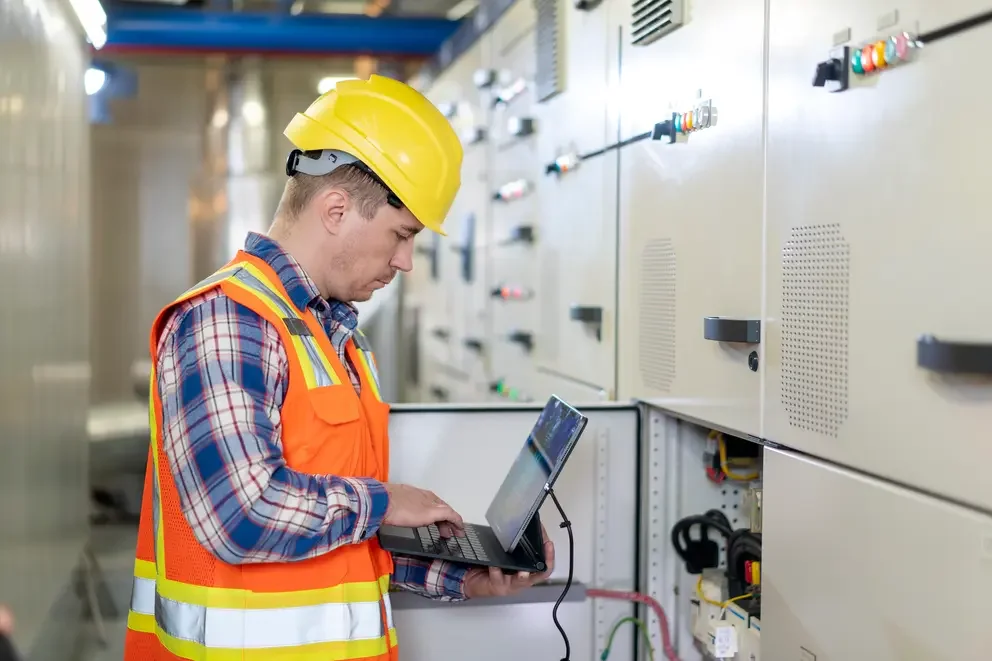Annual Fuel Utilization Efficiency (AFUE) is a measure of how efficiently a heating system uses fuel. It is a rating system used to compare the energy efficiency of heating systems such as furnaces, boilers, and heat pumps.
AFUE is expressed as a percentage and measures the ratio of the energy output of the heating system versus the energy input. It is calculated by dividing the amount of energy output of the heating system (in British Thermal Units, or BTUs) by the amount of energy input (also in BTUs).
The higher the AFUE rating, the more energy efficient the heating system is. Generally, the most efficient heating systems have AFUE ratings of 95% or higher, while lower efficiency systems have ratings between 80% and 85%.
When shopping for a new heating system, it is important to consider the AFUE rating. Higher efficiency systems require more initial investment, but can save you money on energy bills in the long run. Lower efficiency systems may cost less initially, but may not save you money in the long run.
In addition to considering the AFUE rating, you should also look for other energy-saving features such as high-efficiency air filters, programmable thermostats, and zone control systems. All of these can help maximize the energy efficiency of your heating system and save you money on energy bills.
Finally, it’s a good idea to have your heating system serviced regularly to ensure that it is operating at peak efficiency and to make sure that any necessary repairs are made promptly. Regular maintenance helps to ensure that your heating system is performing at its best and can help you save money on energy bills in the long run.
What is the difference between AFUE and other rating systems?
Annual Fuel Utilization Efficiency (AFUE) is the most commonly used rating system for heating systems such as furnaces, boilers, and heat pumps. It is a measure of how efficiently a heating system uses fuel and is expressed as a percentage. AFUE is calculated by dividing the amount of energy output of the heating system (in British Thermal Units, or BTUs) by the amount of energy input (also in BTUs).
AFUE is different from other rating systems, such as the Seasonal Energy Efficiency Ratio (SEER), which measures the efficiency of air conditioners. SEER is calculated by dividing the cooling output of the air conditioner (in BTUs) by the energy input (in watt-hours).
In addition, AFUE is different from the Heating Seasonal Performance Factor (HSPF), which measures the efficiency of heat pumps. HSPF is calculated by dividing the heating output of the heat pump (in BTUs) by the energy input (in watt-hours).
Finally, AFUE is also different from the Energy Star rating, which is a rating system used to compare the energy efficiency of different products. The Energy Star rating is calculated using a variety of factors, including the estimated annual energy consumption of the product.
When shopping for a new heating system, it is important to consider the AFUE rating as well as any other applicable rating systems. Doing so can help you find the most energy-efficient model that meets your needs and can help you save money on energy bills in the long run.
What are the benefits of a high-efficiency heating system?
A high-efficiency heating system has several benefits. The most obvious is improved energy efficiency, which can help to reduce energy bills. High-efficiency systems also generate less waste heat, helping to reduce your home’s carbon footprint.
High-efficiency systems are also quieter and more reliable than their lower-efficiency counterparts. This is because they use fewer parts, making them less prone to breakdowns and requiring less maintenance.
High-efficiency systems also provide more comfort. Since they generate less waste heat, they can keep your home at a more comfortable temperature without the need for constant adjustment.
Finally, high-efficiency systems can save you money in the long run. While they may cost more upfront, their improved efficiency can save you money on energy bills over time. Additionally, their improved reliability can help to reduce repair costs and extend the life of your system.
When shopping for a new heating system, it is important to consider the Annual Fuel Utilization Efficiency (AFUE) rating. Higher efficiency systems require more initial investment, but they can save you money on energy bills in the long run. Lower efficiency systems may cost less initially, but may not save you money in the long run.
What features should I look for to maximize energy efficiency?
When shopping for a new heating system, there are a few features you should look for to maximize energy efficiency.
The first is an Energy Star rating, which indicates that the product has met the EPA’s standards for energy efficiency. Additionally, be sure to choose a model with a high Annual Fuel Utilization Efficiency (AFUE) rating. This will ensure that your heating system is using its fuel as efficiently as possible.
You may also want to consider Zone Control systems and/or programmable thermostats. These allow you to adjust temperatures in different areas of your home depending on usage and preferences. This can help you save money by only heating the rooms that are being used while keeping other areas at lower temperatures.
What other steps can I take to ensure my heating system is running efficiently?
In addition to choosing a high-efficiency heating system, there are a few other steps you can take to ensure your system is running efficiently.
The first is to regularly maintain and inspect your system. This includes changing air filters, cleaning components, and checking for leaks or blockages. Regular maintenance can help your system run more efficiently and reliably.
You should also make sure that any doors or windows near your heating system are well-sealed. This will prevent warm air from escaping and cold air from entering the home. Additionally, you may want to consider adding insulation in the walls or attic if they are not currently insulated. Insulation helps keep warm air inside the home during winter months, helping you save money on energy bills.
Finally, you may want to consider installing a Smart Thermostat. These devices allow you to control your heating and cooling system from anywhere, giving you the ability to adjust temperatures when you’re not at home or when the temperature outside changes dramatically. This can help maximize efficiency and save money in the long run.
What type of maintenance should I do to ensure peak efficiency?
To ensure peak efficiency, your heating system should be routinely inspected and maintained. This includes changing air filters regularly, checking for leaks or blockages, and cleaning the components of your system. If any repairs are needed, have them done promptly by a qualified technician to prevent further damage and maximize efficiency.
You should also make sure that all doors and windows near your heating system are well-sealed to prevent warm air from escaping and cold air from entering the home. Additionally, if you notice any drafts or gaps in insulation around walls or attics, fill them in with additional insulation to help keep warm air inside during winter months.
Finally, consider installing a Smart Thermostat which can help maximize efficiency by giving you the ability to adjust temperatures from anywhere. This will allow you to save energy by only heating areas that are being used and turning down the temperature when no one is home.
What are the potential energy savings from an efficient heating system?
The potential energy savings from an efficient heating system vary depending on the size of your home, the efficiency rating of your system, and how it is used. With proper maintenance and usage, energy bills can typically be reduced by up to 30%. Additionally, choosing a high-efficiency model with features like Zone Control systems and programmable thermostats can help you save even more money in the long run by allowing you to only heat areas when needed and adjust temperatures accordingly. Installing a Smart Thermostat is also beneficial for maximizing efficiency and saving energy.
In conclusion, an efficient heating system that is properly maintained and used can help you save money on energy bills while keeping your home comfortable all year round. So make sure to do your research and consider all of the features available to ensure you get the best system for your home. Read up on energy-efficient heating systems and find out how they can help you save money while still keeping your house comfortable.
Are there any tax credits or other incentives available for purchasing a high-efficiency heating system?
Yes, many states and local governments offer tax credits or other incentives for purchasing energy-efficient heating systems. These incentives may include property tax exemptions, rebates, and grants to help offset the cost of a new system. Additionally, homeowners may be eligible for federal tax credits if they purchase certain types of high-efficiency heat pumps or furnaces.
To find out what incentives are available in your area, contact your local government or utility provider. You can also visit the Database of State Incentives for Renewables & Efficiency (DSIRE) website to find out which programs are offered near you. By taking advantage of these incentives you can save money when upgrading your existing heating system with an energy-efficient model.



